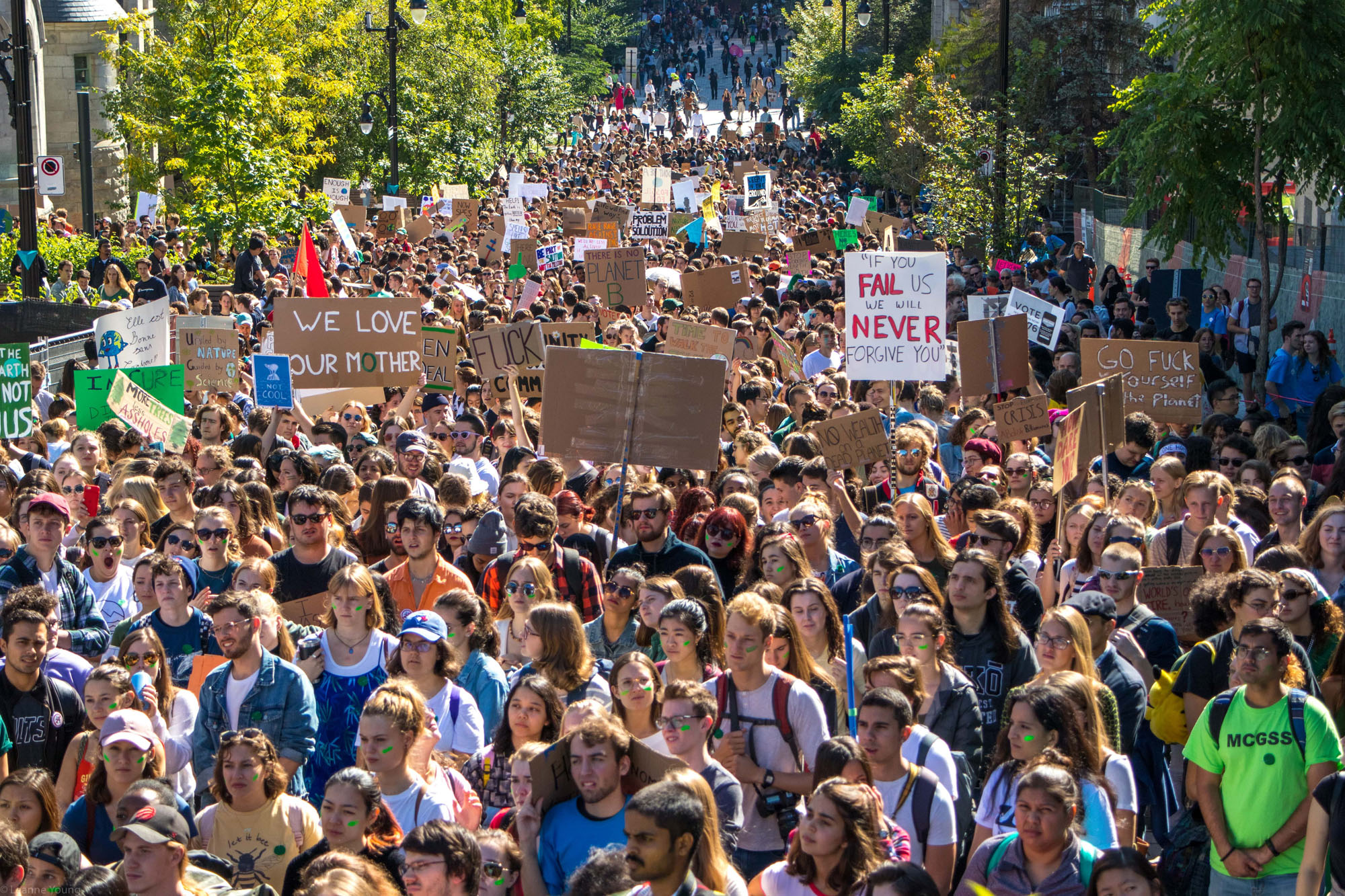Montreal held its second march for climate justice on Sept. 27: The march was part of a series of worldwide climate protests taking place this month, with millions rallying across the globe.
On Sept. 18, McGill’s Senate failed to pass a motion to cancel classes for the strike, although Provost and Vice-Principal Academic Christopher Manfredi asked professors in an email to be accommodating of students who wanted to attend the strike. Several Montreal universities and CEGEPs cancelled classes, including Concordia University, Dawson College, and John Abbott College.
The Arts Undergraduate Society (AUS), the Macdonald Campus Students’ Society (MCSS), the Medical Students’ Association, the McGill School of Environment, and the faculties of law and nursing voted to strike.
McGill’s protest was organised by Climate Justice Action McGill (C-JAM) in coordination with strikes at other Montreal universities and the larger Montreal climate march. Students and faculty members presented three demands to McGill: Publicly acknowledge that fossil fuel companies cause “grave injurious impact” that disproportionately affects marginalised populations, divest from the fossil fuel industry, and pressure the provincial and federal governments to recognise the United Nations Declaration on the Rights of Indigenous Peoples (UNDRIP).
Tomas Jirousek, a member of the Kainai First Nation and Students’ Society of McGill University (SSMU)’s Indigenous Affairs Commissioner, wants McGill to publicly recognise that Indigneous communities are among the most affected by the climate crisis, despite contributing to its effects the least.
“Indigenous people have been fighting [for] climate justice, long before non-Indigenous people joined us in this fight,” Jirousek said. “We have always been fighting to protect this land, and as Indigenous nations, we always will.”
English Professor Darek Nystrom resigned from the Board of Governors (BoG) in April, alongside fellow Board member Darin Barney, over concerns that McGill would once again fail to divest from fossil fuels.
“[Barney and I] spent our time on the Board of Governors explaining that investing in fossil fuels is as if your house is on fire, and you decide to give some money to the guy that’s going to pour more gasoline on that fire,” Nystrom said.
Nystrom was inspired to join the climate justice movement after being impressed by a presentation that Divest McGill gave to the BoG.
“We kept trying to persuade the other Board members of the need to divest, but for three years they kept finding one reason after another not to do so, and I fear that they are heading for another such decision,” Nystrom said. “Because they had stopped listening to us, Darin and I felt that we had no other choice but to resign.”
Nystrom expressed his frustration with Board members and politicians for passing the responsibility to solve the climate crisis over to younger generations.
“The next time someone my age looks at you and they think they’re giving you a compliment by saying ‘you give me hope,’ look them in the eye and say, ‘and what are you going to do with that hope?’” Nystrom said.
16-year-old Swedish climate activist Greta Thunberg addressed a crowd of at least 500,000 people at the Montreal rally. Thunberg has garnered worldwide attention for starting the #FridaysForFuture striking organisation. This peaceful movement calls on students to skip school every Friday to protest outside of their local town halls for climate action.
On Sept. 23, Thunberg gave an emotional speech at the United Nations (UN) Climate Action Summit, criticising world leaders for their failure to prevent irreversible climate damage.
“This week, world leaders […] gathered in New York for the UN Climate Action Summit,” Thunberg said. “They disappointed us again with their empty words and insufficient plans. We told them to unite behind the science, but they didn’t listen [….] It should not be up to us, but somebody needs to do it.”
Thunberg also met with Prime Minister Justin Trudeau before the march, telling him that he was not doing enough to prevent climate change.
“[Canada is] very similar to Sweden, where I’m from,” Thunberg said at the march. “You are a nation that is allegedly a climate leader, and Sweden is also a nation that is allegedly a climate leader. In both cases, it means absolutely nothing.”
Thunberg noted that throughout history big changes tend to follow massive grassroots movements. She believes that skipping school and work to protest is necessary to enact change at the global level.
“Some say that we are wasting lesson time, but we are changing the world,” Thunberg said. “So that when we are older, we will be able to look our children in the eyes and say that we did everything we could back then.”









